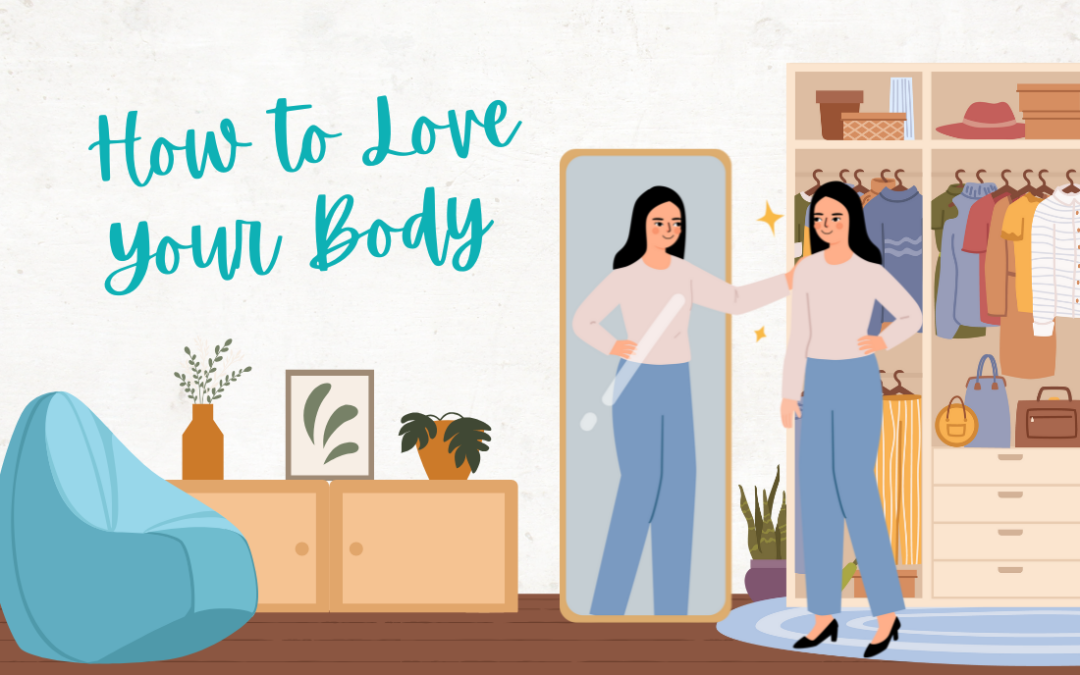If you’re wondering how to love your body, you’re in the right place!
But let me start by saying something that might go against what you’ve heard: you don’t have to love how your body looks in order to treat it with love.
We live in a culture that tells us body love is about feeling beautiful all the time—but the truth is, you can love your body by how you show up for it, nourish it, and treat it.
Loving your body isn’t about constant confidence or liking every inch of yourself in the mirror.
Yes, we can aim for that, for sure!
But body love it about building a relationship with yourself that’s rooted in respect, care, and trust. The real magic happens when you stop waiting for the day you finally like your appearance and start living as someone who deserves kindness now.
Because you do. Right now. As you are.
Written by Jenn Hand, Holistic Nutritionist, Board Certified Health Coach, NBC-HWC
Table of Contents
- How I Started to Love My Body
- 10 Tips to Help You Learn to Love Your Body More
- How to Handle Body Image Setbacks and Bad Days
- Why Comparing Your Body to Others Hurts Isn’t Helpful (and How to Stop)
- How to Nurture Loving Thoughts for Yourself
- Common Questions
How I Started to Love My Body
For so many years, I thought my body was the problem.
My body was “gross.” And I needed to fix it!
I spent my late teens and twenties chasing the so-called perfect shape—counting calories, taking diet pills, obsessing over every bite, bouncing between strict diets and late-night binges.
I truly believed that if I could just control my body, I’d finally feel confident, lovable, and enough. This wasn’t a conscious thought at the time—I just 100% believed that if I lost weight and was thinner, I’d be happier and confident in myself.
But no matter how much weight I lost, it was never enough.
The goalpost kept moving, and the inner war with myself only got louder. The more I dieted, the more I binged, and the yo-yo weight gain/loss cycle kept getting more extreme. The one constant was that I desperately wanted to “get back to” my thinnest, which is what fuelled the cycle.
If only I could get back to that lower weight, I thought… THEN I’d feel okay.
It wasn’t until I hit a breaking point—burned out, exhausted, and disconnected from who I was—that I realized I couldn’t keep living this way. I had no idea how to love my body, but I knew I couldn’t keep hating it.
My wake up call happened when I looked in the mirror at my lowest weight (the weight I thought would be the thing that would make me happy) and still hated what I saw in the mirror.
I still had critical thoughts. That’s when I started asking different questions.
- What if my worth didn’t depend on my weight?
- What if my happiness came from within rather than from a specific size?
- What if I could be kind to myself even when I didn’t like what I saw in the mirror?
Learning to love my body wasn’t a straight path.
It looked like crying on the bathroom floor, writing angry journal entries, celebrating tiny wins, and slowly letting go of the belief that I had to “fix” myself. And while I don’t wake up every day in full-blown body bliss, I live with peace now. I trust my body. I respect it.
And I know, deeply, that I am more than how I look.
That’s the kind of freedom I want for you, too.
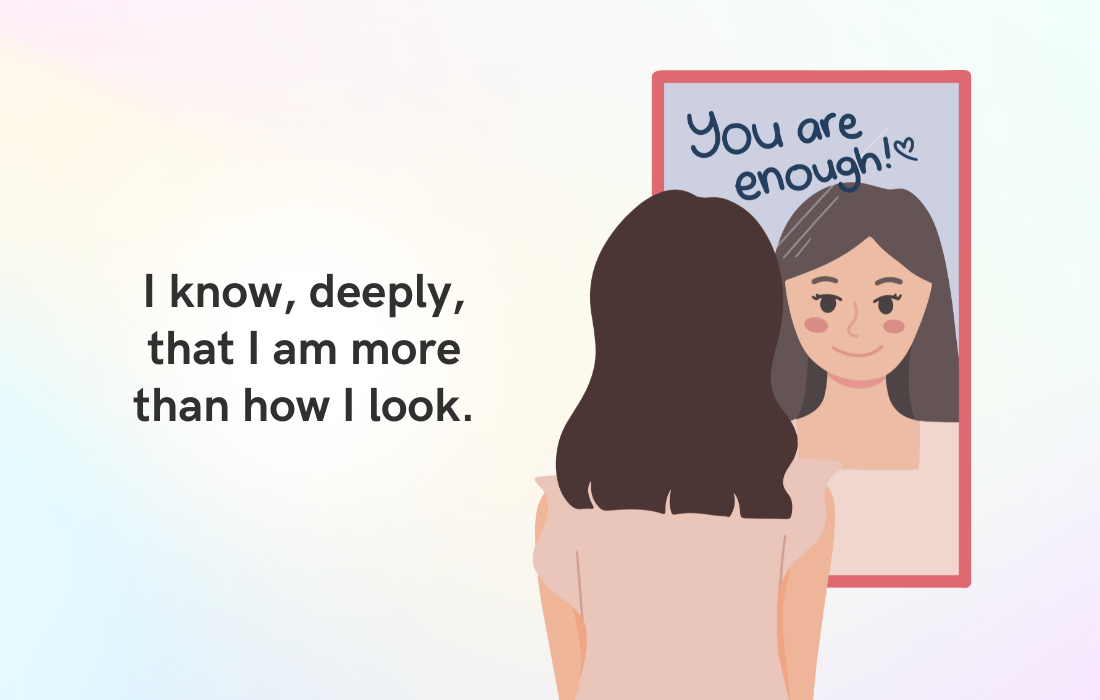
10 Tips to Help You Learn to Love Your Body More
Loving your body isn’t a flip-the-switch kind of thing—it’s a journey that takes time, patience, and a lot of unlearning.
For years, I thought I had to reach a certain size before I could even begin to feel good about myself. But real healing came when I started showing up for my body exactly as it was—messy days, tough emotions, and all.
If you’re not sure where to start, these ten tips can help you begin building a more peaceful, compassionate relationship with your body.
1. Be Aware Daily of What You Say to Yourself Around Your Body
We’re often not even conscious of how critical our inner dialogue is.
For me, it started with realizing just how often I said things like, “You’re disgusting,” or “You look awful in that outfit” or “You have no control, what’s wrong with you?” That awareness hurt at first—it made me see how deeply rooted my body image issues were. But awareness is the first crack in the wall and the first step towards change.
We can’t change what we’re not aware of! Once you notice those thoughts, you have a choice to shift them. Pay attention to what you say to yourself in the mirror, when you see your reflection in a window, when you’re getting dressed and throughout your day.
2. Aim for Body Neutrality at First, Not Body Love
At my lowest, telling myself “love your body” felt like a lie.
I was definitely not in a space of self-acceptance. And I wasn’t overflowing with positive feelings about my appearance. So it felt like a massive jump from where I was. How was I supposed to love my body when I actually hated my body?
So at first I aimed to be neutral about my body. Instead of focusing on loving how my stomach looked, I’d say, “This is my body today, and I don’t have to punish it.” That tiny shift brought so much relief. I’d try to describe myself in facts, rather than have each statement be filled with shame and judgement. “I am 5 ft 5 inches. I have dark brown hair. I have green eyes.”
Can we look at our body size and shape in the same way? As an expression of where we are right now that just is? You don’t need to jump from hate to love—there’s so much healing in the in-between.
3. Change the Messages You Give Yourself
We become the stories we tell ourselves.
I used to wake up and immediately start scanning my body for what was “wrong.” I’d look at myself in the mirror naked, to see if my stomach looked “okay.” (Hint: it never did to my own mind.)
Slowly, I began introducing new messages—gentler ones, like “You’re allowed to be okay in this skin” or “Your body deserves peace.” These small daily statements softened the grip of body hate. They reminded me I could write a new narrative.
I also reminded myself every day “You are more than your body.”
This was huge in helping me shift beyond thinking that my physical size was the only thing about me. This mantra helped me focus on who I am, what I wanted, and connected me to the spiritual part of myself.
4. Remove Negative Influences from Your Environment
When I was working on my body struggles, social media wasn’t what it was now.
But it can be helpful to unfollow anyone who makes you feel like your worth is tied to my physical appearance. Whether it’s a friend, family member or influencer, keep your feeds filled with only those who make you feel positive about yourself.
For me, I worked to surround myself with inspirational books and magazines to help lift my spirits and remind me that there was a world out there beyond “trying to be thinner.” I also got rid of old jeans and clothes that taunted me from the back of my closet and made me feel bad looking at them.
Your environment matters—see if you can surround yourself with those things that inspire you!
5. Surround Yourself with Supportive People
Similar to your environment, the people you spend time with can also impact your healing.
I worked really hard to surround myself with people who weren’t obsessed with dieting and body. I began seeking out people who got it—who understood mental health, self-worth, and what it meant to struggle with your body.
When you’re around those who lift you up, not shrink you down, it’s easier to believe you’re worthy of love just as you are.
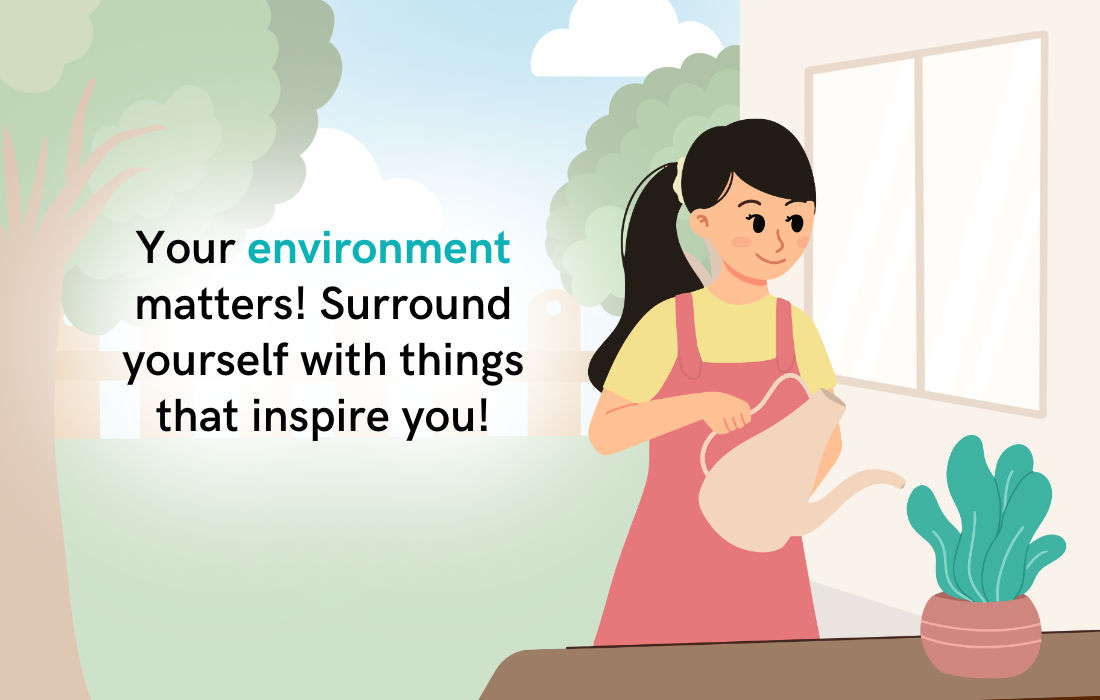
6. See Your Body as Functional and Powerful
Seeing my body as functional and powerful was life-changing for me.
It’s also something I still work on. When I stopped obsessing over my stomach or what I needed to “fix” and started focusing on what my body could do—hike, dance, cry, hug, walk me up mountains—I felt a deeper body connection than I ever had before.
Your body is not just decoration, nor is it your defining factor. It’s a living, breathing vessel that carries your soul, dreams, and the essence of who are you.
7. Practice Gratitude for Your Body
I used to roll my eyes at the idea of gratitude.
It is cliche, but also true! When I started naming one thing—just one—about my body I was thankful for each day, it softened me. “Thank you, legs, for moving me up that mountain hike.” “Thank you, stomach, for digesting food and keeping me alive.”
Gratitude won’t erase body criticism overnight, but it gently pulls your attention toward the good. And with repetition, it opens the door to acceptance and love over time!
8. Reframe Your Thoughts About Exercise and Eating
For years, I exercised to punish myself for what I ate, to work off too much food, and to “earn” the right to eat something at a restaurant or that wasn’t on my plan.
This punishment focused way of approaching movement left me exhausted and depleted. I worked hard to shift from my mind from punishment to nourishment—to move my body because it felt good and eat because I was hungry—not because I was “being good”—and slowly things shifted over time.
Nourishment and joyful movement are acts of body love, not control. Can you explore approaching movement and food as something that supports you, lets yourself take care of your mind/body, and is deeply nourishing?
9. Avoid Engaging with Materials that Make You Feel Bad about Your Body
This sounds obvious, but how often do we keep going back to the things that trigger us?
That influencer who always looks flawless, that article on how to lose weight fast, that friend who always talks about her latest diet. It chips away at your confidence in subtle ways. Be protective on your mental and emotional space and who (or what) you let in!
We don’t need more reasons to feel not enough—we need reminders that we are enough, exactly as we are.
10. Try Journaling as a Way to Work Through Your Negative Self Talk
I like to say that journaling is free therapy!
Journaling helped me dig more deeply into my body image issues—not just the surface stuff, but the deeper issues of not feeling lovable, worthy, or “good enough.”
When I wrote freely, without censoring myself, I found patterns I hadn’t seen before. And that awareness gave me power to heal.
If you’ve never journaled before, start with a simple prompt: “What do I believe about my body, and where did that come from?” or “Do I truly believe I am enough? Where did I learn about what makes me enough?” Write what comes up.
Healing begins with honesty.
🌷 Related Topic: Emotional Eating Coach: Overcome Emotional and Binge Eating
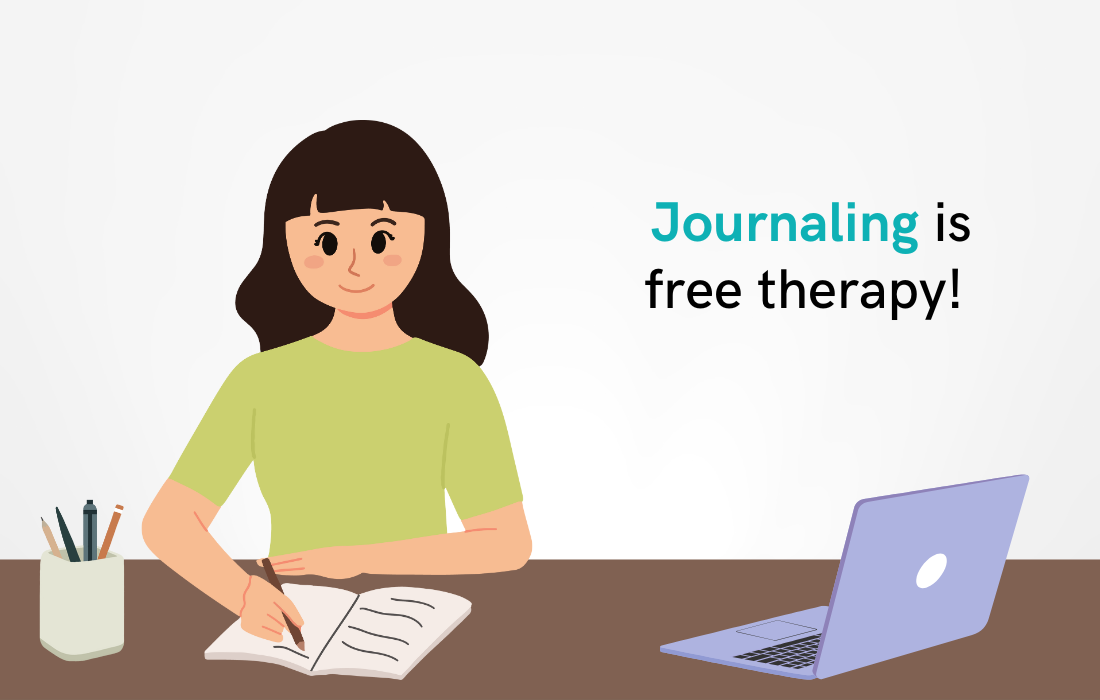
How to Handle Body Image Setbacks and Bad Days
I promise that you’re not failing if you have a bad body image day.
I’ve had many periods over the years that have challenged my progress and times when I thought I was “done” this work when old patterns crept back in. This work is layered and messy, and it’s completely normal to feel like you’re backsliding sometimes.
When body hate creeps in, pause and acknowledge the pattern without judgment—your feelings are valid, but they don’t necessarily mean what you’re thinking is true. We think thousands of thoughts a day—they aren’t all true!
Instead of spiralling into shame or trying to “fix” your physical appearance, ask yourself what your heart needs in that moment: rest, compassion, a walk, or maybe just silence.
See if you can find deep comfort and give yourself the utmost kindness—cuddling up under your favorite blanket, drinking a warm cup of tea, doing some heart connecting breathing exercises—and remind yourself that you are more than a reflection in the mirror.
Healing your relationship with your body isn’t about achieving positive body image 24/7; it’s about learning to stay kind to yourself, even in the dark moments.
Why Comparing Your Body to Others Hurts Isn’t Helpful (and How to Stop)
It’s natural for us to compare ourselves to others.
One thing I always remind myself is that “comparison is the thief of joy”… it robs us of peace, self-trust, and the possibility of body connection. When you measure your worth against someone else’s body, you lose sight of your own progress, your own story, and everything that makes you you. These comparisons often stem from the need for external validation and a belief that we need to “fix” our bodies or lose weight to feel worthy.
One way to shift this is to become aware of when comparison sneaks in and gently redirect your thoughts.
Ask yourself, “What am I really craving right now?”—usually, it’s not someone else’s body, but your own sense of enough-ness. I always have tried to use the sneaky comparison thoughts as a way to connect with what I want.
Envy of someone’s body usually means I want to feel comfortable in my OWN skin.
My mind convinces me that her “perfect body” gives her that. But now having worked with hundreds of women over the years, I know that even those who have the “ideal body” by societal standards struggle with negative self-image. It’s impossible to connect to your own worth and work to love your body when you compare your external reflection to someone else’s highlight reel.
Pay attention to when those thoughts pop up and bring yourself back to your journey and what YOU deeply want!
How to Nurture Loving Thoughts for Yourself
Loving yourself doesn’t start with forcing body love when you’re not ready.
It can begin with neutrality and learning to observe your body as is (“I have green eyes” “I am a size X”) which takes some of the criticism out of our body views. This moves into softening around the edges of your own body dissatisfaction.
It’s not a linear path, nor is it a one time decision. It’s a process that is often windy.
But bit by bit, you begin treating yourself like someone you care about. Little acts of kindness—speaking gently to your reflection, listening to your body’s needs, or choosing nourishment over punishment—plant seeds of acceptance. And one day, those seeds bloom into something beautiful: not perfection, not a “goal weight,” but a peaceful, grounded, unshakable relationship with yourself.
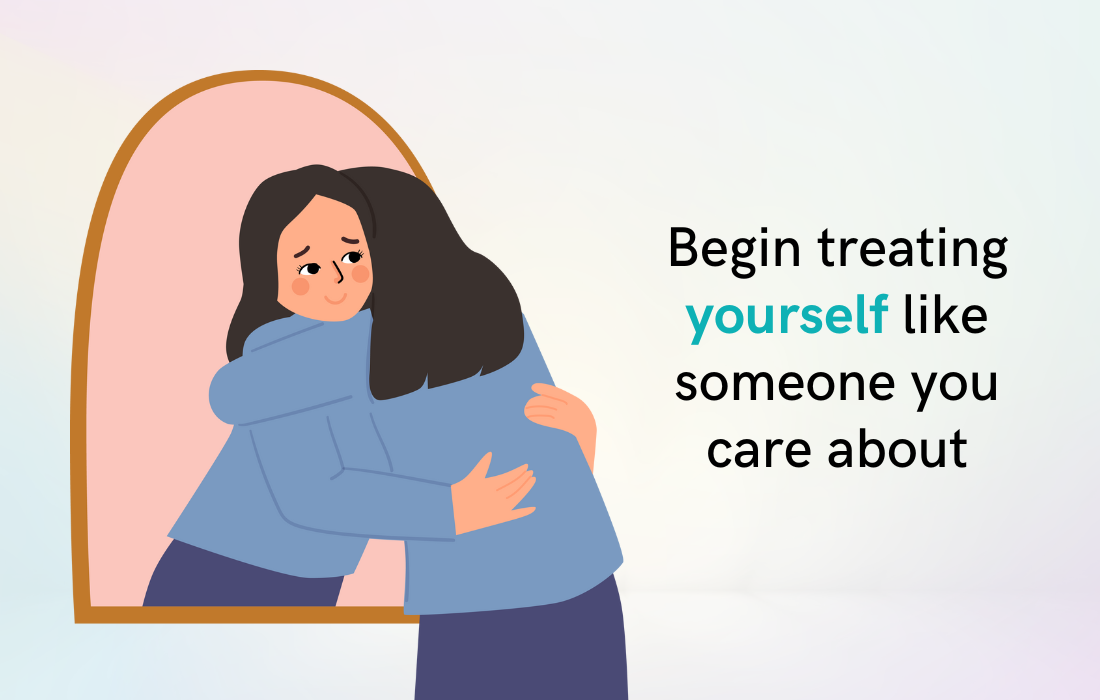
Common Questions
Why do I feel like I hate my body even when I try not to?
Because we’ve spent years internalizing the belief that a thinner body shape is better.
Even when we want to feel differently, those old messages still linger beneath the surface and unlearning them takes time, compassion, and practice.
You’ve also probably spend many hours analyzing other people’s bodies and comparing your body shape to theirs. This has set you up to have a critical eye when you look at yourself—even as you try to be positive.
It will take time to overcome the mental tapes that you’ve been playing in your mind. But, don’t worry! You’ll get there.
What are easy ways to show myself I love my body?
Do small things that feel good in your body—wear clothes that fit at your size now, stretch or move in a gentle way that feels nourishing, rest when you’re tired.
These daily choices send a powerful message of care and respect. Remember that human life is about much more than just your body. Your body serves as a vessel for you life experience, not as a measuring stick for your self worth.
Can I stop feeling like I hate my body without changing how I look?
Absolutely. Body peace comes from shifting how you think about your body, not how it looks. This takes time and patience, but it is possible!
Why is it so hard for me to love my body?
Because we’ve been conditioned to believe love only comes when we “fix” ourselves.
It takes time to unlearn that and offer love to the body you have now.
How are body positivity and body neutrality different?
Body positivity is about celebrating your body; body neutrality is about accepting and respecting your body without needing to love every part of it. Both can be part of the healing path.
Related Articles
⚪ Emotional Eating Quiz
⚪ How to Stop Hating Your Body
⚪ When You Can’t Stop Hating Your Body…
⚪ Why Do I Hate My Body?
Get the Normal Eater’s Newsletter
Join 8000+ women who are overcoming overeating, binge eating, and breaking up with dieting forever. Get Jenn’s inspiring and actionable weekly newsletter with the latest posts, podcasts, and tips on how to love your body, find food freedom, and lose weight holistically.
Get the Normal Eater’s NewsletterWork with an Emotional Eating & Holistic Nutrition Coach
Overcome Bingeing and Emotional Eating and Break Up with Yo-yo Dieting
Working with an emotional eating coach and holistic nutritionist can help you get free from the frustrating binge and restrict cycle and stop yo-yo dieting.
You don’t have to be obsessed with food or have a million rules around eating to find your natural weight and learn to love your body. Ready to actually see a lasting change and experience true freedom?
Schedule a 20-min CallAbout the Author:

Jenn Hand has been helping women like you become normal eaters since 2015.
She’s worked with thousands of women, helping them to balance their bodies, end bingeing, stop obsessing over food, and start feeling amazing again. As a board-certified health coach and holistic nutritionist, Jenn knows how to support you in making real positive changes that last.
Her articles have been published on Mind Body Green, Tiny Buddha, Thrive Global and other local and global media platforms. She’s the author of How to Be a Normal Eater and the creator of The Normal Eater’s Club program. Listen to Jenn’s advice and tips on the Cake Doesn’t Count Podcast, or read more of her articles for free on the Food Freedom Blog.
Learn About Coaching!
